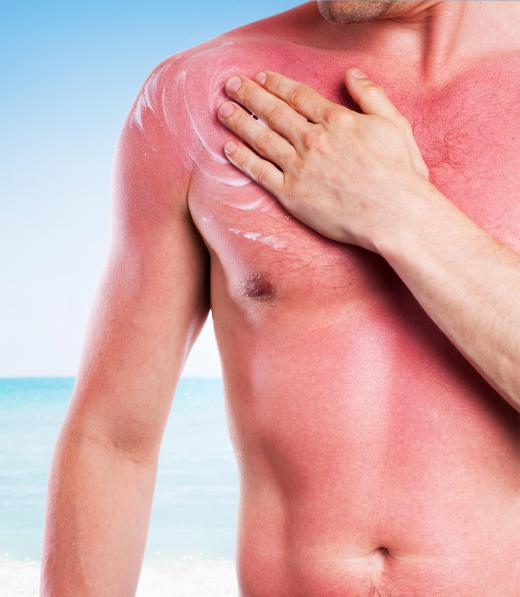What are Ultraviolet Waves?
Light is made of both waves and particles. The rate at which these waves oscillate determines what type of wave it is. Ultraviolet waves (UV waves) are waves that are shorter than violet light--the shortest light wave humans can detect with our eyes. Ultraviolet waves are between 100 and 4000 angstroms (10-400 nanometers). This is shorter than visible light but longer than X-rays and gamma rays.
The shorter the wave in the spectrum, the more energy it has and the faster it oscillates. The more energy a wave has, the more dangerous it is to humans. The higher energy means that the waves can penetrate further into the human body and cause more damage. Ultraviolet, X-rays, and gamma rays are all waves that are shorter than violet on the light spectrum. While all three can be damaging to humans, ultraviolet waves have become the most well-known.

The most harmful ultraviolet waves are kept out by the Earth's atmosphere, but some are able to sneak in. This can be both a good or bad thing since ultraviolet waves are both helpful and harmful. Some animals, like bees, can detect UV light and see special patterns in flowers that lead them to the source of the nectar. In addition, the waves can also give scientists a different view of the universe. By using specialized cameras and equipment, scientists are able to study the sun, stars, as well as different objects on our own planet.

Another benefit to ultraviolet light is its ability to sterilize. UV waves are used in air and water purifiers as a way to eradicate bacteria and viruses. The waves are also instrumental in our bodies' production of vitamin D. When UV waves hit the skin, they stimulate the vitamin's production. While it is true that UV waves contribute to vitamin D production, it is important not to overexpose yourself to any form of ultraviolet light.

One of the most common forms of damage caused by UV waves is sunburn. When the waves hit the skin, they can damage or kill skin cells. Over time, the overexposure to UV waves can also lead to skin cancer. Since sunburn is caused by ultraviolet waves, it is even possible to get sunburned on a cloudy day; wearing the appropriate protection all the time is important. Limiting the exposure to ultraviolet waves over a lifetime can help people avoid those disastrous side effects.
AS FEATURED ON:
AS FEATURED ON:















Discussion Comments
So many people rely on the radiation from ultraviolet waves in tanning beds to feel attractive. I have friends who are deeply tan because of their use of the beds, and though it may look good for awhile, it starts to make them look really old before long.
We all know that ultraviolet waves from the sun can do bad things to our bodies. Why on earth would anyone wear sunscreen outdoors but subject themselves to the same harmful rays in a tanning bed without any protection?
Several of my friends who have been tanning for years have skin that looks thick and dried out. We are the same age, but they look about ten years older than I do. I never use a tanning bed, and though I am very fair-skinned, I am fine with my appearance, because I know that my skin is healthy.
There are a lot of uses for ultraviolet waves. I think it's cool that black lights use emit long ultraviolet waves, but they emit the UVA kind that isn't as bad for us.
I have heard that people who inspect airplanes and cars for defects use a black light, because it will show all the imperfections. It can also make certain biological material glow, so crime scene investigators use it.
My favorite use of black light is at a party, though. It makes everything that is white glow, and people often wear white on purpose if they know that a black light will be in use. Some people even wear lipstick and nail polish that will glow under a black light, and it is strange to see a person's lips and nails glowing so brightly across the room.
@shell4life – My mother spent a lot of time in the sun when she was younger, and she never wore sunglasses. Now, she has these little yellow bumps on the whites of her eyes. She hates how they make her look, but there is really nothing she can do about them.
She said that she used to feel like her eyes were sunburned after a day at the beach, and indeed, they were. She said it felt as though sand had gotten on her corneas and scratched them, and she kept tearing up. Her eyes also got bright red streaks across them.
It is a good thing that you make a practice of wearing sunglasses. Just make sure that they filter out both UVA and UVB waves, like your sunscreen.
I never knew that the wavelength of ultraviolet waves was so short. When I picture short waves penetrating the air, I imagine that they emit a high-pitched frequency that would really hurt our ears if we could hear it.
I don't know whether or not the heat that we feel from the sun has anything to do with the high amount of energy in ultraviolet waves, but I would imagine that it does. I just picture these intense waves surrounding us like the heat in an oven and slowly baking us.
I have a low tolerance for sun exposure, so I have to always wear sunscreen that protects against UVA and UVB waves. I also wear sunglasses, because I've heard that ultraviolet waves can damage our eyes, as well.
Post your comments